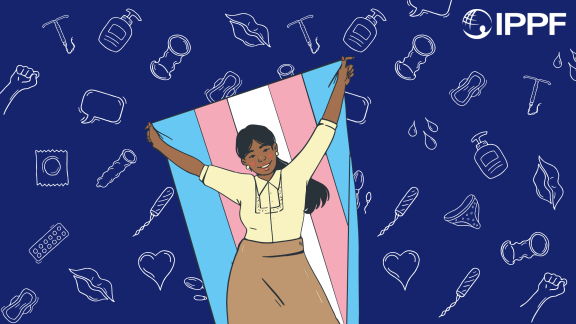As we observe World Contraception Day, it’s essential to recognize that contraception is not just a concern for cisgender people. For many trans men, trans women, and non-binary individuals, access to contraception is a critical aspect of sexual and reproductive health. However, the healthcare system often overlooks or inadequately serves trans people when it comes to contraception. This blog highlights the reasons why trans people need access to contraception and the importance of developing trans-friendly healthcare services.
Why Trans People Use Contraception
Contraception is relevant to many trans people, regardless of their transition status or identity. For trans men who have sex with cis men, contraception may be necessary to prevent pregnancy, even if they are on testosterone. While testosterone can reduce the likelihood of ovulation, it does not entirely eliminate the possibility of pregnancy. Additionally, some trans men use hormonal contraception to stop menstruation, which can help align their physical experience with their gender identity.
For trans women, while pregnancy prevention may not be a direct concern, contraception can still play a significant role. Some trans women in sexual relationships with cis women may use contraceptive pills or other methods to help prevent unintended pregnancies for their female partners. Additionally, trans women may use contraception to protect against sexually transmitted infections (STIs) or to manage hormone levels in ways that complement their gender-affirming treatments.
In short, contraception plays a role beyond pregnancy prevention—it is an important part of broader sexual and reproductive health for all trans people.
when
Subject
Contraception, LGBTI+

Contraception is relevant to many trans people, regardless of their transition status or identity.

Barriers to Accessing Contraception for Trans People
Trans people face numerous barriers when trying to access contraception. One major obstacle is the lack of trans-specific training for healthcare providers. Many providers don’t understand the unique needs of trans people, leading to uncomfortable or discriminatory experiences. For example, a trans man might avoid seeking contraceptive care due to fear of judgment or being misgendered.
According to the Exploratory Survey of Trans People who have used Healthcare Services in Colombia, 85% of respondents believe that healthcare providers are not sufficiently educated in regard to their needs. Furthermore, 83% feel that healthcare professionals lack adequate training and skills, while 69% think that healthcare services do not offer inclusive care. Alarmingly, 57% of trans individuals have avoided healthcare services altogether, fearing that their gender identity would negatively impact the care they receive.[i]
Another challenge is the prevalence of misinformation. Some trans men, for instance, believe that testosterone alone makes them infertile, which is not always the case. This misinformation leaves many people at risk of unintended pregnancies. Similarly, trans women may struggle to find clear information on sexual health, such as how hormone therapy interacts with contraceptive options like condoms, birth control pills for their female partners, or STI prevention. For example, in parts of South Asia, trans women are not consistently using condoms, contributing to the rise of HIV infections in some countries. This underscores the need for accessible, accurate information about sexual health and contraception within trans communities.
How to Create Trans-Friendly Contraceptive Services
Developing trans-friendly contraceptive services is critical to ensuring that trans people have access to the care they need. This starts with healthcare providers receiving proper education on the specific needs of trans patients. Providers should learn to use inclusive, gender-affirming language, and understand how hormone therapy interacts with contraceptive methods for both trans men and trans women.
Healthcare environments should also be welcoming and inclusive, with visible signs that affirm all gender identities. Clinics can provide educational resources specifically tailored for trans people, explaining the different contraceptive options available and how they might interact with gender-affirming care, including hormone therapy.

Developing trans-friendly contraceptive services is critical to ensuring that trans people have access to the care they need. This starts with healthcare providers receiving proper education on the specific needs of trans patients.

Trans Activism: Leading the Way in Raising Awareness
Across the globe, trans activists are taking the lead in raising awareness about contraception and trans identities. Through campaigns, educational content, and advocacy, they are working to ensure that trans people have access to inclusive, respectful healthcare. These efforts focus on addressing the unique needs of trans people, highlighting the importance of contraception in their lives, and advocating for comprehensive sexual and reproductive health services.
By sharing personal stories and experiences, these activists are breaking down barriers, combating stigma, and making sure trans voices are at the forefront of conversations around reproductive health. Their work shows how crucial it is for trans people to shape the discourse, ensuring that healthcare systems recognize and meet their needs.
A Call to Action: Building Inclusive Healthcare for Trans People
As we celebrate World Contraception Day, it’s time to push for more inclusive, trans-friendly healthcare services. Contraception is not only about preventing pregnancy but also about supporting the overall sexual health and well-being of trans people. Providers, healthcare systems, and policymakers must work together to create environments where trans men, trans women, and non-binary people can access the contraceptive care they need without fear, stigma, or misinformation.
By listening to the voices of trans activists and understanding the diverse needs within the trans community, we can create a healthcare system that serves everyone—regardless of gender identity—with dignity and respect.











